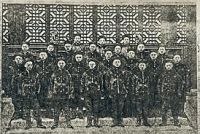Difference between revisions of "Wuchang Uprising"
imported>Ciic (Created page with 'thumb|200px|left|Wuchang Uprising '''The Wuchang Uprising''' of Oct. 10, 1911, was a massive armed revolt against local authorities in [[Wuchang]...') |
imported>Ciic |
||
| Line 1: | Line 1: | ||
[[file: Wuchang Uprising.JPEG|thumb|200px|left|Wuchang Uprising]] | [[file: Wuchang Uprising.JPEG|thumb|200px|left|Wuchang Uprising]] | ||
| − | '''The Wuchang Uprising''' of Oct. 10, 1911, was a massive armed revolt against local authorities in [[Wuchang]], [[Hubei Province]], by revolutionaries in a modernized army formed by the government. It led to the Revolution of 1911, which overthrew the Qing Dynasty (1644-1911) and feudalist rule, and the establishment of the Republic of China. | + | '''The Wuchang Uprising''' of Oct. 10, 1911, was a massive armed revolt against local authorities in [[Wuchang]], [[Hubei Province]], by revolutionaries in a modernized army formed by the government. It led to the Revolution of 1911, which overthrew the [[Qing Dynasty]] (1644-1911) and feudalist rule, and the establishment of the [[Republic of China]] (1911-1949). |
| − | The mutiny broke out only after an accidental explosion. Revolutionaries in the Russian concession were building a bomb (Wuchang had a modern military industry and manufactured weapons and other military equipment for the New Army) when one suddenly went off; this led to a police investigation, which uncovered lists of members of the Literary Society, an anti-government group, within the New Army. Facing arrest and execution, the revolutionaries revolted and the army took over the city in less than a day. The local Qing officials fled, and over the next two months, 15 southern provinces seceded in support. | + | The mutiny broke out only after an accidental explosion. Revolutionaries in the Russian concession were building a bomb (Wuchang had a modern military industry and manufactured weapons and other military equipment for the New Army) when one suddenly went off; this led to a police investigation, which uncovered lists of members of the [[Literary Society]], an anti-government group, within the New Army. Facing arrest and execution, the revolutionaries revolted and the army took over the city in less than a day. The local Qing officials fled, and over the next two months, 15 southern provinces seceded in support. |
The Qing government’s delayed response gave the revolutionaries enough time to declare a provisional republican government joined by a number of provincial assemblies other than the Manchurian rulers. | The Qing government’s delayed response gave the revolutionaries enough time to declare a provisional republican government joined by a number of provincial assemblies other than the Manchurian rulers. | ||
Revision as of 00:50, 21 September 2011
The Wuchang Uprising of Oct. 10, 1911, was a massive armed revolt against local authorities in Wuchang, Hubei Province, by revolutionaries in a modernized army formed by the government. It led to the Revolution of 1911, which overthrew the Qing Dynasty (1644-1911) and feudalist rule, and the establishment of the Republic of China (1911-1949).
The mutiny broke out only after an accidental explosion. Revolutionaries in the Russian concession were building a bomb (Wuchang had a modern military industry and manufactured weapons and other military equipment for the New Army) when one suddenly went off; this led to a police investigation, which uncovered lists of members of the Literary Society, an anti-government group, within the New Army. Facing arrest and execution, the revolutionaries revolted and the army took over the city in less than a day. The local Qing officials fled, and over the next two months, 15 southern provinces seceded in support.
The Qing government’s delayed response gave the revolutionaries enough time to declare a provisional republican government joined by a number of provincial assemblies other than the Manchurian rulers.
